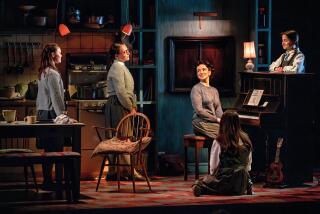Growing Into the Part
As she nears 60, actress Barbara Tarbuck finds that aging has its perks, even in a profession that is often cruel in its demand for youth and beauty.
“You do get to do some of the great roles,” said the Los Angeles-based veteran who has had a varied career on stage and television for more than 30 years. Since 1997, Tarbuck has played a series of classic, emotionally charged maternal parts: Linda Loman in “Death of a Salesman” at San Diego Repertory, Kate Keller in “All My Sons” at International City Theatre in Long Beach and Mary Tyrone in “Long Day’s Journey Into Night” at the Dallas Theatre Center.
Now, at 59, she is about to reach into the painful truths that make aging a matter of such anguish and avoidance in American culture. For the first time, Tarbuck will have to play one of the terrifying scenes of growing older: In Richard Dresser’s barbed comedy “Wonderful World,” her character will have a massive stroke. For Tarbuck, the need for the old and the young to understand each other is at the crux of Dresser’s play. The show is having its West Coast premiere Saturday at the Laguna Playhouse after debuting earlier this year in Louisville at the Humana Festival of New American Plays.
Tarbuck’s character, Lydia, is the mother of grown sons who have a close but fraying bond. Both are having relationship problems--older brother Barry is dominated by his controlling wife, while Max can’t bring himself to commit to his longtime fiancee.
Tarbuck’s stroke scenes certainly hit close to home. Her mother suffered one in 1989 and died two years later. The actress’ husband, earthquake-preparedness specialist Dennis Connolly, had one three years ago, suffering losses of vision, equilibrium and memory. “He has recovered remarkably” and returned to work, Tarbuck says. The wiry, outgoing Detroit native who seems as interested in hearing about others’ experiences as relating her own spoke during an interview at the playhouse’s rehearsal hall in Laguna Hills. “But this was a genuine touch with mortality, a great wakeup call. It makes you aware of how fragile we are.”
For Tarbuck, part of the actor’s craft is to suck up all available experience and return it, artfully filtered, for an audience. Therefore, she says, she places no psychic cordon between what happened to her loved ones and what must happen to her each night on stage. “I watched that whole experience, and I’m pulling from it.”
Dresser, in a separate interview from his riverfront home in the upstate New York town of Hastings-on-Hudson, said that a good deal of Lydia’s surface circumstances are based on the close extended family he knew growing up on the outskirts of Worcester, Mass. (As for the story itself, he says, it contains “nothing personal and is strictly a work of my imagination.”)
“I was close to several of my aunts, who became quite debilitated,” he said. “Various older family members have had strokes, and something about that [going] in and out of clarity has always intrigued me.”
Like Dresser’s family, which used such terms as “elevenzies” and “nooners” as “a refined WASP way of talking about having a drink in the morning,” Lydia and her brood relish a cocktail or two at get-togethers, but Dresser doesn’t see them as problem drinkers.
“Until about 10 years ago, it was possible for somebody to have a drink onstage without somebody wanting to put him in a 12-step program,” Dresser said.
One of his script’s odd touches--a bevy of poorly synchronized clocks that chime away in Lydia’s house--is another small detail lovingly preserved from Dresser’s youth. “My grandmother and two maiden aunts lived in a house with all these clocks. There was a big sort of ritualistic aspect to winding them all, but since they were old, they would never keep perfect time and it was a bit of an insane asylum with everything going off” at different times.
Tarbuck is partly from another era herself. She got her professional start at age 9 on a Detroit radio show, acting opposite adults who had performed in such serials as “The Lone Ranger” and “The Green Hornet” during the golden age of radio.
As a young actress, she took lots of training, earning theater degrees from Wayne State in Detroit, the University of Michigan and Indiana University. But she regarded the jump to New York City, then the only outlet for a stage career, with some dread. Tarbuck said she gained the confidence she needed after winning a Fulbright grant for a year’s study at the London Academy of Music and Dramatic Art.
Upon her return, she launched her career in an off-Broadway play, “America Hurrah,” then continued in a long tour of “Lamp at Midnight,” directed by Tyrone Guthrie and starring Morris Carnovsky as Galileo. Her other prominent New York shows during the 1970s and early 1980s included first-run productions of Harold Pinter’s “Landscape & Silence,” David Mamet’s “The Water Engine” and Neil Simon’s “Brighton Beach Memoirs.”
She moved to Los Angeles in 1978 for a short-lived television series, “California Fever.” Tarbuck met and married her husband, gave birth to a daughter, Jennifer, who is now a film student at New York University, and began picking up regular work in network television and commercials. She has gravitated back to the theater in recent years, playing the classics but also taking roles in a stream of new works, among them “The Beginning of August” at South Coast Repertory and “The Cripple of Inishmaan” at the Geffen PlayhouseShe chuckles that people recognize her most often for her four seasons playing Lady Jane Jacks, an Australian billionaire, on the daytime soap opera “General Hospital.” Lady Jane existed primarily as an accouterment to her son, played by heartthrob Ingo Rademacher. When Rademacher left the show last year, Tarbuck’s gig went with him. A few weeks ago, while in the checkout line at a supermarket near her home in Mar Vista, Tarbuck picked up a soap opera tabloid and saw that Rademacher was headed back to “General Hospital.”
She thinks her services as Rademacher’s mom--and the nice, steady paycheck that comes with the job--may be required again. “It would be a delight, but I don’t wait by the phone for any job. I just try to keep moving.”
Offstage, Tarbuck tries to bridge the disconnect between the young and the seasoned by teaching a weekly acting course through UCLA Extension.
“We’re taught in this culture to look to youth so much, especially in this field,” she said. “I find my contact with college students just invaluable. They seem to think I’m so cool and hip, which makes me laugh and pleases me. It’s not that I’m cool or hip, but that we’ve got something to say to each other.”
*
“Wonderful World,” Laguna Playhouse’s Moulton Theater, 606 Laguna Canyon Road, Laguna Beach. Tuesdays-Sundays, 7:30 p.m. Matinees Saturdays and Sundays, 2 p.m. Previews end tonight. Opens Saturday. Ends Aug. 26. $24 to $45. (714) 497-2787.
More to Read
The biggest entertainment stories
Get our big stories about Hollywood, film, television, music, arts, culture and more right in your inbox as soon as they publish.
You may occasionally receive promotional content from the Los Angeles Times.











